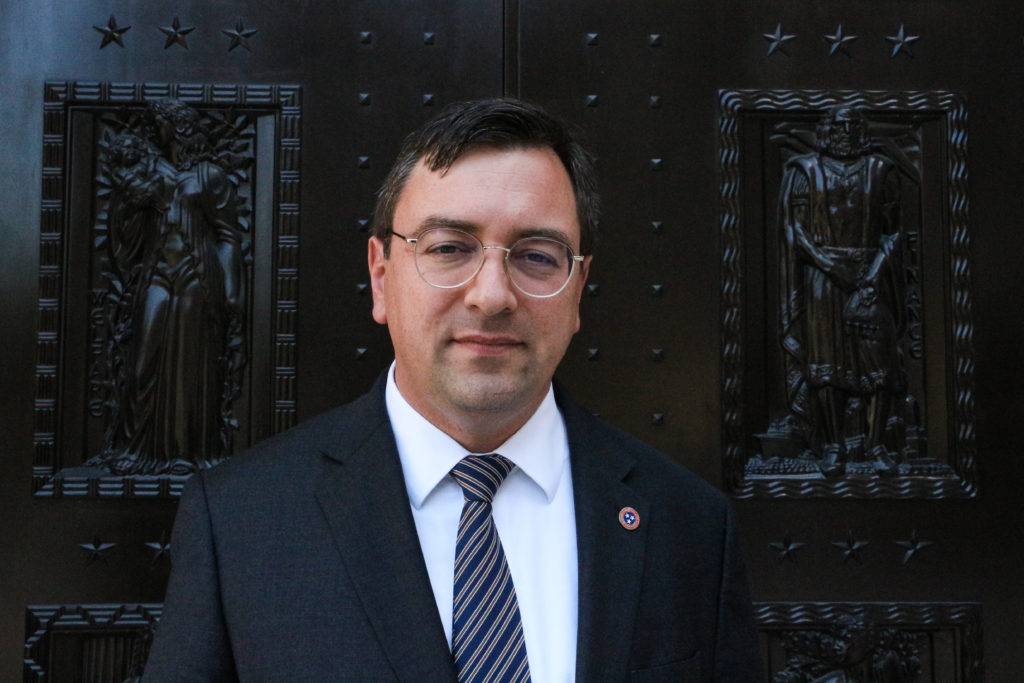
Tennessee is unique as the the only state in the U.S. where the attorney general is appointed by the state Supreme Court, not elected by the public. The state’s new attorney general is Jonathan Skrmetti, who took over on Sept. 1 from Herbert Slatery. He’ll serve in that role for the next eight years.
Skrmetti is a Harvard graduate, a father of four and Franklin resident. He was deputy attorney general and previously served as chief legal counsel to Gov. Bill Lee.
He says he didn’t set out to become an AG, but the opportunity opened up after his predecessor decided not to seek another term.
“I had originally thought General Slatery was going to re-up for a while,” Skrmetti tells WPLN News. “And it was very close to the deadline, just a few days before the deadline, where I started to seriously think about putting in for it. I did end up putting in at the last possible minute. I think I got my application in about a half hour before the deadline, which goes to show that the skills writing papers at the last minute in college can pay off for you.”
Clearing up misconceptions about the AG’s office
Since taking office, Skrmetti has already been more open to the media than his predecessor. That’s intentional — although Skrmetti is the first to say that he does not have a lot of media training. He says he’s a lawyer, not a politician.
He wants to be more transparent so people understand what it is the AG does in Tennessee.
“There have been some efforts to reform the attorney general’s office over the last few years that I think are based on a misunderstanding of what the office is and what we do,” says Skrmetti.
He says being appointed instead of elected really changes the role here compared to other states.
“We tend to be a much more law-oriented office than a lot of my colleague’s offices where if you have to run for re-election every four years, your brain is halfway focused on fundraising and politics all the time,” Skrmetti says. “Whereas here, my only job is to be a good lawyer.”
 Paige Pfleger WPLN News
Paige Pfleger WPLN NewsJonathan Skrmetti sits at his desk in the Attorney General’s office.
Enforcement of the state’s abortion ban
Skrmetti steps into the role of the state’s top prosecutor about a month after Tennessee’s abortion ban took effect.
The law contains no explicit exceptions for rape or incest or the life of the pregnant person. Instead, it includes an affirmative defense for doctors to use if they are charged — to prove the procedure was medically necessary.
Patients are already reporting delays in care as doctors talk to their lawyers.
From a legal and medical standpoint, doctors and lawyers say it would be easier to care for patients with an exception added into the law.
Skrmetti says he think lawmakers will likely discuss whether a change is needed during the upcoming legislative session.
“I think based on the reactions from doctors and from the legal community, the legislature has been hearing that there’s room for some clarification here,” he says.
But when asked if he supports adding an exception for the life of the pregnant person, he says it’s not his place.
“I don’t want to presume to make policy. Because this really is something where there has to be democratic accountability and where the people need to be able to work through their representatives to make the law and to move the law,” Skrmetti says.
He added that, so far, no one has been prosecuted under Tennessee’s abortion law, called the Human Life Protection Act.
Skrmetti says local district attorneys will be the ones to decide whether to prosecute cases under the new ban.
Nashville’s district attorney, Glenn Funk, has previously stated he has no intention to prosecute an abortion provider, which could put him at odds with the state’s top prosecutor.
“I will not prosecute any woman who chooses to have a medical procedure to terminate a pregnancy or any medical doctor who performs this procedure at the request of their patient,” Funk said in May.
Under a new law, Skrmetti could step in and appoint a special prosecutor to take on those cases. But Skrmetti says to do so would require very specific circumstances.
“If there’s a situation where a prosecution would be merited and you have a D.A. categorically disclaiming a desire to prosecute, you know, that moves beyond prosecutorial discretion and turns into them second guessing the legislature,” says Skrmetti. “And under those circumstances, I would seek the appointment of a pro tem prosecutor from the court.”
Fentanyl as a ‘weapon of mass destruction’
Earlier this month, Skrmetti signed on to a letter urging President Joe Biden to classify fentanyl as a ‘weapon of mass destruction,’ joining 17 other state AGs.
He says the designation is warranted because fentanyl could be used in a terrorist attack.
“My concern is there was evidence that you can use fentanyl to kill very large numbers of people at one time,” Skrmetti says. “And you can do it using pretty cheap, common, readily available materials. And obviously, that’s way too much fentanyl available.”
As deputy attorney general, Skrmetti served as a negotiator in the $26 billion multistate opioid settlement, and says overdose deaths remain a serious problem in Tennessee.
He says he does not intend to use the classification to step up enforcement of everyday drug cases.
“There’s a difference between, I think, what someone would have for drug abuse purposes and what someone would have for mass murderer purposes,” Skrmetti says. “And then there would also have to be other evidence of intent and a delivery system to make that prosecutable.”

